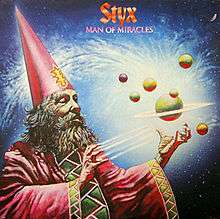Man of Miracles
Man of Miracles is the fourth album by Styx, released in November 1974. Produced by John Ryan and Bill Traut, who had produced the band's first two albums, this would be the band's last original album on the independent Chicago-based label Wooden Nickel Records before moving to the major label A&M.
The original issue contained "Best Thing," a re-release from the Styx album, as the opening track on side two. A second release of Man of Miracles substituted the song "Lies," originally recorded by The Knickerbockers in 1966. The album was reissued in 1980 with new artwork and a newly abbreviated title, Miracles. This version started the second side with "Unfinished Song."
Track listing
Original release
- "Rock & Roll Feeling" (J. Young, J. Curulewski) – 3:02
- "Havin' a Ball" (J. Curulewski, J. Young) – 3:53
- "Golden Lark" (D. DeYoung) – 3:23
- "A Song for Suzanne" (D. DeYoung) – 5:15
- "A Man Like Me" (J. Young) – 2:57
- "Best Thing" (James Young, Dennis DeYoung) – 3:13
- Replaced in the second release by "Lies" (Buddy Randell, Beau Charles) – 2:41
- Replaced in the 1980 reissue by "Unfinished Song" (D. DeYoung, C. Lofrano) – 2:57
- "Evil Eyes" (D. DeYoung) – 4:02
- "Southern Woman" (J. Young, Ray Brandle) – 3:10
- "Christopher, Mr. Christopher" (D. DeYoung) – 4:02
- "Man of Miracles" (J. Young, D. DeYoung, Ray Brandle) – 4:55
Personnel
Production
- Producer: John Ryan for Chicago Kid Productions
- Engineer: Gary Loizzo.
Charts
Album – Billboard (North America)
| Year |
Chart |
Position |
|---|
| 1974 |
Pop Albums |
154 |
|
Artwork
The cover art was designed by Leon Rosenblatt, whose name is printed on the back credits as "Lee Rosenblatt."[3]
Miscellaneous
The initials "LJR" are plainly visible in the wizard's beard, and were likely hidden there by the album's artist, Leon J. Rosenblatt.
References
|
|---|
| | | | Studio albums | |
|---|
| | Live albums | |
|---|
| | Compilations | |
|---|
| | Singles | |
|---|
| | Related articles | |
|---|
|
-
 Book Book
-
 Category Category
|
|
